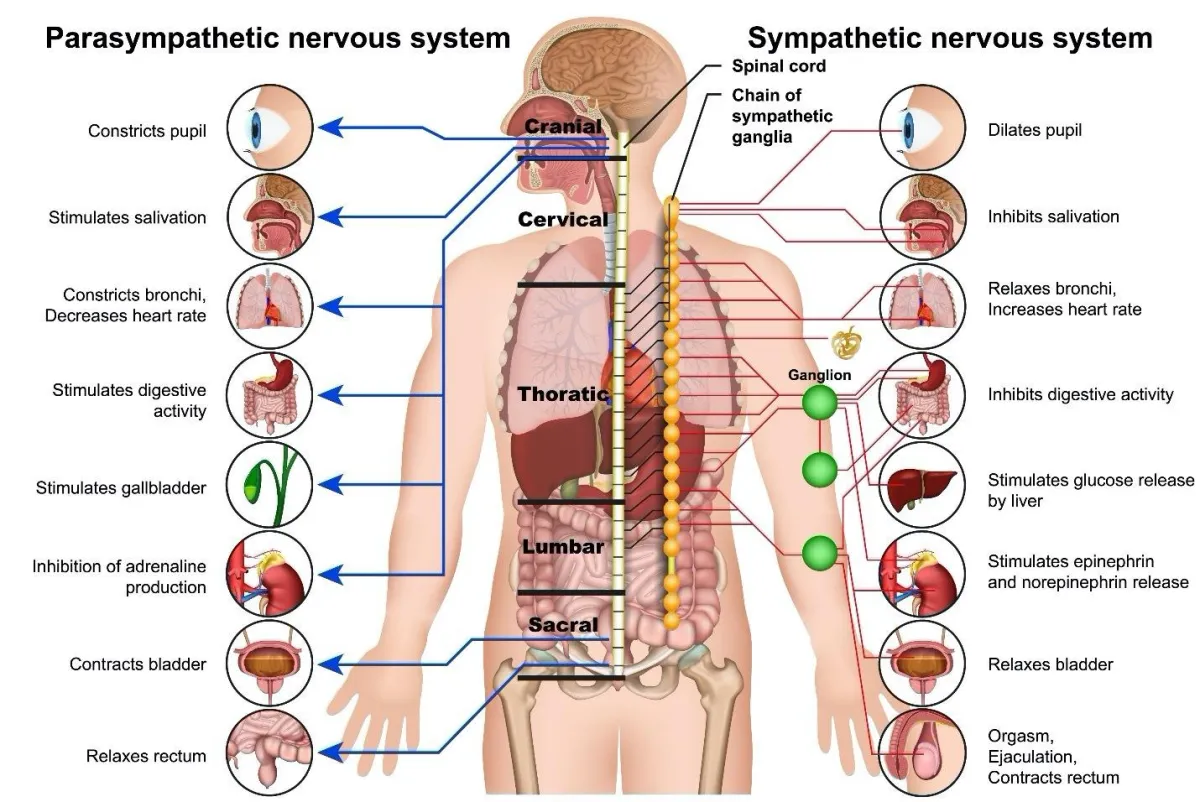
Calm Relaxed Confident
Neurobiology
The Effects of “Stress” Hormones and “Happy” Hormones –
The bad news and the brilliant news
When your brain feels threatened, by a physical (external) or emotional (internal) stressor, it responds by preparing your body for action – the fight or flight response. Upon your brain or body experiencing stress, the amygdala sends distress signals to the hypothalamus which activates the endocrine (hormonal) system and the sympathetic nervous system. Both of these systems are unconscious and involuntary. The pituitary gland is stimulated to release the hormone ACTH. This causes the cortex (outer layer) of the adrenal gland to release the steroidal hormones cortisol and aldosterone which have a range of effects on the body to help it respond to stress, short-term and long-term. The sympathetic nervous system is activated, triggering the secretion of adrenaline and noradrenaline, from the medulla region (inside) of the adrenal gland. This increases the level of noradrenaline in the brain which interacts with receptors in the central nervous system to create physical responses.
Cortisol:
· Supresses the immune system by preventing production of white blood cells so inflammation decreases, in the long term however this can cause chronic inflammation and delayed response to infection, so you are susceptible to illnesses
· Gluconeogenesis (protein and fat to glucose) which allows increased levels of glucose to muscles for increased respiration and to the brain for increased awareness
Aldosterone:
· Increases blood volume and pressure by increasing the uptake of sodium and water by the kidneys, long term this could lead to hypertension and cardiovascular damage
Adrenaline and Noradrenaline:
· Increased heart rate
· Increased blood pressure
· Increased breathing rate
· Deep breathing
· Glycogenolysis (glycogen to glucose) allows increased levels of glucose to muscles for increased respiration and to the brain for increased awareness
· Vasoconstriction which diverts blood away from the skin and gut and towards the heart, lungs and muscles
· Increases your body temperature
This is what we know as our ‘Fight or Flight Response’
The sensation of the triggered Sympathetic Nervous System is also the uncomfortable physical feeling we get that we call ‘stress’, ‘anxiety’ or ‘overwhelm’.
Human Nervous System’s Reaction to Relaxation and Stress

The Bad News- Stress Hormones (For feelings of stress, anxiety and depression)
In humans, the natural, default state is the Parasympathetic Nervous System (Rest, Digest, Repair).
The Sympathetic side should only trigger in moments of necessary exertion.
We should reset back to our default state quickly after exertion but in modern times this does not happen and we remain in the Sympathetic, stressed state for too long, unable to return to our natural default setting.
Prolonged, chronic, repeated activation of the Sympathetic Nervous System (stress response) can lead to a state of chronic arousal known as ‘sympathetic overdrive’ from cortisol and adrenaline.
This can cause a range of physical and psychological symptoms including:
· Increased heart rate and blood pressure
· Rapid breathing or hyperventilation
· Headaches
· Sweating
· Shaking or trembling
· Dizziness or light-headedness
· Nausea
· Stomach upset (IBS)
· Muscle tension or pain
· Fatigue or exhaustion
· Difficulty concentrating or thinking clearly (Brain Fog)
· Insomnia
· Irritability or mood swings
· And more!
These symptoms lead to conditions like anxiety, chronic stress, depression and Fibromyalgia
In individuals with Fibromyalgia, repeatedly triggering the Sympathetic Nervous System – the sensation of ‘being stressed’ leads to a Flare Up of symptoms, causing increased pain, fatigue, headaches, gastrointestinal disturbances, and cognitive problems. Flare Ups can last several days or weeks and can be influenced by stress levels, sleep quality and overall health. The exact causes of Fibromyalgia are not well understood but it is believed to be influenced by a combination of factors including genetics, physical and emotional stress and environmental factors.
To manage Fibromyalgia Flare Ups, it is important to identify and avoid triggers that create a stress response and to develop strategies to manage potentially stressful events and promote relaxation. This may include lifestyle changes such as regular exercise, hypnotherapy or guided meditation, relaxation exercises, psychosensory techniques, deep breathing, progressive muscle relaxation and similar techniques, alongside medications or other treatment prescribed by your doctor.
Research has shown that stress can trigger a flare-up of symptoms in individuals with Fibromyalgia.
One study found that exposure to psychological stressors (unhelpful thoughts) was associated with an increase in pain sensitivity and other Fibromyalgia symptoms (1).
Another study found that individuals with Fibromyalgia who reported higher levels of stress had greater disease severity and a poorer quality of life (2)
The Good News – Happy Hormones (for feeling of happiness, well-being and relaxation)
By using Hypnosis and other techniques, we can counteract the effects of the ‘stress hormones’ on the Sympathetic Nervous System by bringing forward ‘happy hormones’, those that are associated with relaxation, happiness, contentment, and well-being.
Serotonin:
· Involved in regulating mood, emotions, sleep, appetite and various cognitive functions. It contributes to feelings of happiness, contentment and overall well-being
Oxytocin:
· Released during intimate social interactions such as cuddling, hugging and physical affection, contributing to feelings of relaxation, stress reduction and a sense of connection with others, it plays a crucial role in social bonding, trust and attachment
Dopamine:
· Released when engaging in rewarding activities such as eating delicious food, engaging in enjoyable hobbies or achieving goals. It is associated with motivation, reinforcement and feelings of pleasure, as well as regulating movement and cognitive functions
Endorphins:
· Released during Activities like exercise, laughter and certain foods to help promote a sense of well-being and euphoria, alleviates pain and reduces stress
Oestrogen:
· Influences mood, memory and emotional well-being. Associated with feelings of happiness, improved cognitive function and a sense of emotional stability. Oestrogen is present in both females and males at different levels
Progesterone:
· Contributes to mood regulation. It has calming and sedative effects to promote feelings of relaxation and tranquillity
Hypnosis and additional thought-changing processes, psycho sensory therapies, and mind enhancing techniques can increase the levels of various hormones related to feeling happier and as these counteract the stress hormones you will feel better
physically, mentally, and emotionally
At Calm Relaxed Confident I offer programs that will teach you how to use these techniques for yourself so that you can remain emotionally stable which in turn prevents stress hormones from creating flare ups of chronic illness, chronic pain and sensations of anxiety and overwhelm
References
(1) Bazzichi L, Giacomelli C, Consensi A, et al. One year in review 2017: fibromyalgia. Clin Exp Rheumatol. 2017 Nov-Dec:35 Suppl 105(6):6-12
(2) Hsu MC, Wang TS, Jeng SF et al. The associations between fibromyalgia syndrome and anxiety and depression symptoms: a population-based study. Medicine (Baltimore). 2016 May;95(19):e3628
Stephanie Cavendish BA(Hons) CHt, Tft-Adv
Certified Hypnotherapist since 2008


©2023 Calm Relaxed Confident